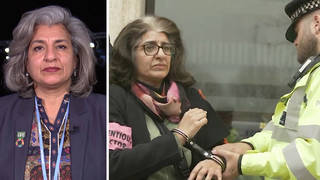
Guests
- Meena Ramanclimate change coordinator for the Third World Network. She is also the honorary secretary of Friends of the Earth Malaysia.
The first week of U.N. climate talks is wrapping up. On Monday, nearly 150 world leaders, including President Obama, gathered in Paris on the first day of the talks. Obama praised fellow world leaders for submitting voluntary pledges to cut greenhouse gas emissions, but others criticize what they see as empty promises. “President Obama said that the developed world and the United States will assume its responsibility and will do something about it to combat climate change,” says Meena Raman, climate change coordinator for the Third World Network. “However, that is quite rhetorical. If you look at the way the negotiations are going, the United States negotiators and their positions in the talks are far away from assuming any responsibility. What they’re doing is shifting the responsibility to the developing world. … So what President Obama says is ringing hollow.”
Transcript
AMY GOODMAN: Meena Raman, I want to bring you into this discussion. You are with Friends of the Earth Malaysia. You’re a longtime climate leader. What do you think needs to happen here? And what do you think of this first week of negotiations? Have—you feel that this Paris accord is anywhere closer to acceptable?
MEENA RAMAN: Well, I think part of the difficulty we are having here is the way the U.S. has come to the talks. When, you know, Minister Paul Oquist mentioned about how the contributions that are on the table, the commitments that parties—or the pledges that parties have put on the table, if you look at those pledges, we agree that they are far away from keeping the temperature below 1.5 degrees, let alone 2 degrees. But I think what has to happen is that the historical emitter, which is the United States, not assuming its responsibility and its leadership, as President Obama mentioned in his speech—I was—I listened to his speech, and President Obama said that the developed world and the United States will assume its responsibility and will do something about it to combat climate change. But, however, that is quite rhetorical, because if you look in the way the negotiations are going, the United States negotiators and their positions in the talks are far away from assuming any responsibility. In fact, what they’re doing is shifting the responsibility to the developing world.
Now, Minister Paul mentioned about China and the United States. I don’t think you can compare them equally. Historically, the United States emitted much of the emissions. The wealth of the rich world grew in a frame where there was no constraint on climate. Today we have a limited carbon space left, and if we don’t act responsibly, in 20 to 25 years that space runs away. Now, the developing world, who is the least responsible for much of those historical emissions, they have huge challenges. And if you take countries like China, like India, if you look at it in terms of the huge numbers of population, if you look at how many people are poor, if you look at the kind of per capita emissions, and you compare that with the United States, I think you can’t make the—you can’t put them on the same footing.
And what we’re seeing here is that the United States wants an approach which is the United States nationally determines according to its national circumstances. What this essentially means is that the United States does not want the international community to set an international target for how developed countries must do their emission reductions. So if everybody is going to take the approach of the United States, where it decides what it wants to do, when it wants to do, and so this is not assuming responsibility or leadership.
So, what President Obama says is ringing hollow, because the United States has taken every—everybody on a path that bottom-up approaches can work. This is not about bottom-up approaches. The time for that is long gone. So what really needs to happen is that for developed countries to do the drastic emission reduction cuts that they must do. And this is, of course, toxic here, because they won’t have any targets set internationally. Even the target that the United States has put on the table, it does not want that to be legally binding.












Media Options